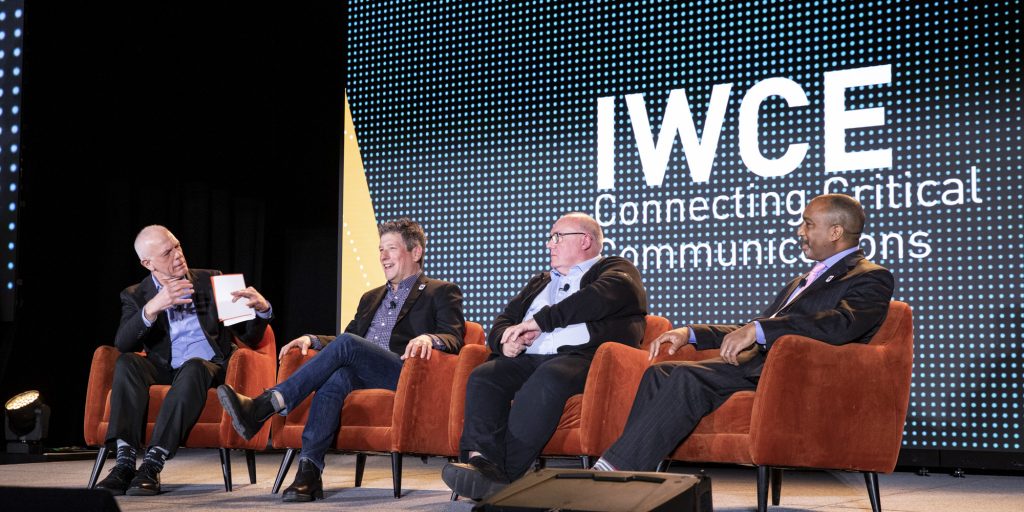IWCE 2023: American cities are gearing up for some of their largest sporting events ever
Between the 2028 Los Angeles Olympic and Paralympic Games, the Rugby World Cup in 2031, and the North America 2026 FIFA World Cup, which will be co-hosted by 11 U.S. cities along with five others in Mexico and Canada, American cities are gearing up to host some of their largest sporting events ever in the coming decade.
“Over the next nine years, we have three mega events that will be hitting the soil of North America,” said Ken Rehbehn, principal analyst at CritComm Insights, at an IWCE 2023 keynote last Tuesday titled “Big Games in North America: What You Need to Know About FIFA 2026 & LA 2028,” describing them as “a wave of massive multi-venue and in some cases multi-sport events. They have tremendous scale and global reach: The entire world is watching as these events are happening.”
Beyond the incredible amount of technological planning that must take place between now and then, organizers are working with local governments to minimize the impact on host communities. In Los Angeles, David Michael, organizer of the 2028 Olympic and Paralympic Games, said they won’t be building any new facilities for the event.
“The Olympic games can put a lot of pressure on the host city. One of the things we made a central part of the bid when we put in the bid for the games, we want to leave the L.A. region better than when we found it,” he said, noting the city hosted the 1932 and ’84 games, so the infrastructure is already there. “We are privileged, actually, to have more venues than we need.”
Unlike other countries, taxpayers don’t subsidize the Olympics when they’re held in the United States. Because of that, the L.A. 2028 organization will grow rapidly from a small organization today to a multi-billion corporation by 2028, then it will close its doors. Organizers anticipate selling 12 million tickets for events held at more than 40 venues across the city.
Michael said the games will require 500,000 people to work it, including many highly skilled tech positions, and will bring in 30,000 journalists from around the world. In the leadup, they’re investing $160 million into a program called PlayLA to “Grow sport for kids and young people,” he said.
The initiative is $10 to register for and features sports clinics ranging from swimming to baseball, football to skateboarding. Adaptive programs include track, tennis, judo, golf, para-surfing, wheelchair tennis and sitting volleyball, among other sports. So far, 90,000 children have enrolled in 35 sports. PlayLA is aimed at getting children, “especially underprivileged kids, into sport and interested in sport,” Michael continued.
There are also a lot of considerations from a safety standpoint—both offline and online, according to Bill Bob Brown Jr., executive assistant director for emergency communications with the Cybersecurity and Infrastructure Security Agency (CISA). A central foundation to hardening systems against an attack is partnership, he said, noting the agency is already gearing up for L.A. 2028.
Collaborating across sectors and governments, and bringing together experts, is key when putting on sporting events.
“At a bare minimum, we think about relationships. How are we partnering?” Brown asked. “As we’ve worked in large venues across the country over the years—the Super Bowl, those kinds of events—the goal is partnerships.”
Given the cybersecurity agency’s involvement in past events, “There’s a very well-worn pathway,” he continued. “It’s not just communications work, but the energy sector, the transportation sector, the waste sector, all of those (sectors) working together to reduce risk and provide capabilities.”
Planning for all contingencies in large sporting events is a vital part of this collaborative effort, said John Dundas, radio and spectrum planning manager at DundasTech Limited. Dundas was a communications consultant for the 2022 FIFA World Cup in Qatar, which featured eight stadiums with seating capacities between 40,000 and 80,000.
“Plan for failure, hope for success. You plan for the biggest disaster that can happen, then at the end of it, see where it goes. We don’t know if all the planning we do will work. It’s quite a weird way of doing it,” Dundas said, noting that, a year before, they held a full-scale rehearsal to test that systems worked and adjust those that fell short.
“When it came to the World Cup, I was bored,” Dundas said. “I was bored for six weeks, which is great, because it means it worked.”
IWCE 2023 took place last week at the Las Vegas Convention Center. Next year, it will be held in March in Orlando, Fla. For more information, visit IWCEexpo.com.




















